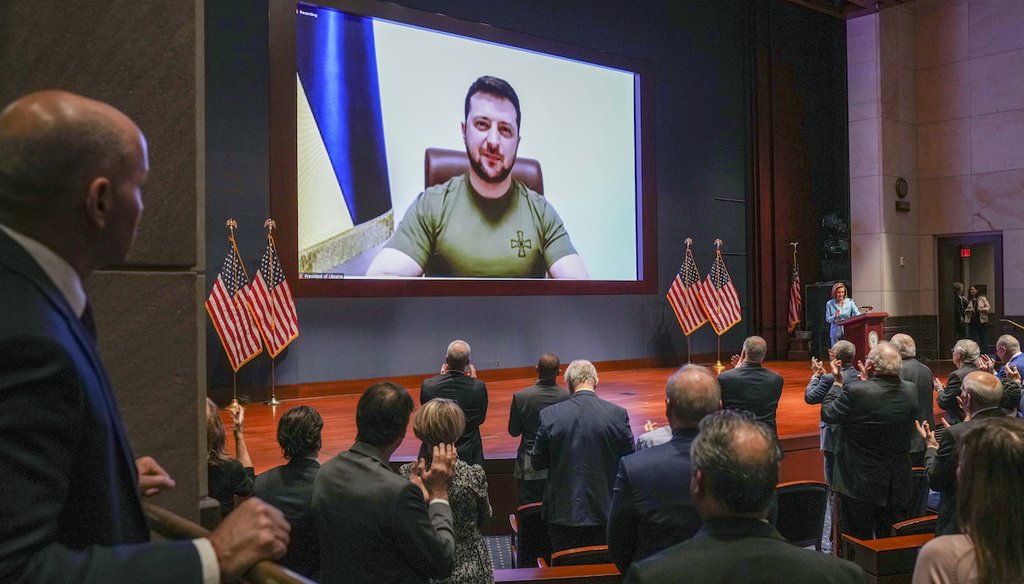Stand up for the facts!
Our only agenda is to publish the truth so you can be an informed participant in democracy.
We need your help.
I would like to contribute

Members of Congress give Ukraine President Volodymyr Zelensky a standing ovation before he speaks in a virtual address to Congress in the U.S. Capitol in Washington, March 16, 2022.
If Your Time is short
Wartime propaganda has run rampant in the Ukraine-Russia conflict. While Russia’s misinformation has received much attention, Ukraine’s government has also shared misleading content.
Researchers who study misinformation online say Ukraine has shared misinformation to boost morale and marshal support. Ukraine’s efforts pale in comparison to the disinformation campaign Russia has been undertaking for years.
Russia has blocked or restricted access to social media platforms within Russia, made it illegal to use the words "war" or "invasion," and signed into law jail penalties for anyone who broadcasts or publishes information about the invasion that the Russian government deems to be false.
But fact-checkers have also found cases in which Ukraine’s government has shared misleading content.
Some of Ukraine’s official social media accounts have pushed stories of questionable veracity, like the heroic yet unverified account of the Ghost of Kyiv, a single pilot who single-handedly shot down several Russian fighter jets. Others have shared fake road signs with expletives aimed at Russians to boost morale. Government accounts have re-shared videos with digital effects that depict unreal explosions in Paris, France, in order to evoke emotion in the international community.
Experts say that so far these instances seem largely indicative of a wartime battle to boost morale in a nation under siege by an outsized power that has been practicing the art of spreading disinformation for years.
"While it's fair to criticize the Ukrainian government for sharing some misinformation, this is not a fair fight," said Scott Radnitz, director of the University of Washington’s Ellison Center for Russian, East European and Central Asian Studies and faculty member at the UW Center for an Informed Public. "The Putin regime is waging an Orwellian campaign full of propaganda. The two sides are not equally guilty of this, it’s not even a close call. This is really a David and Goliath battle."
Because they are outmatched militarily, researchers say that Ukrainian officials are working hard to shape perception, especially for international audiences that they are relying on for help.
"Ukraine is pulling out all the stops, and information is the area where they have a strategic advantage and they are trying to exploit that. These are part of a broader campaign for Ukrainians to shape the narrative," Radnitz added.
The tactic was important in the Soviet Union era for those who weren’t able to openly protest, experts said. It was a way to slyly subvert the ability of the people in power to rule over them.
For Ukraine, it’s a way to subvert the destruction campaign to erase their country off the map.
"If Ukrainian officials passed off digitally altered signs as authentic, that's somewhat problematic," said Rebekah Tromble, director of the Institute for Data, Democracy, and Politics at George Washington University. "But in the midst of war, I think there are much greater concerns. After all, believing these signs are real is unlikely to harm anyone. In fact, it's more likely to have positive impacts by, for example, boosting Ukrainians' morale."
At most, she added, it gives the Russian government some fodder to say that Ukrainian officials lie – "but the Russian government is saying that already."
Researchers recommend that people pause before sharing anything they come across online. If something seems too good to be true, it might be. Check the source to see if it’s considered reputable by other reputable organizations.
"Cautiously approach information designed to raise strong emotional reactions, especially fear or anger. With war raging, fear and anger are often justified. But if they're being used to score points, especially political points, we should naturally be more skeptical," Tromble said. "Finally, be aware that the fog of war creates a lot of uncertainty, even for experts. And so it's particularly important that we slow down and avoid jumping to conclusions too quickly about what's fake and what's real."
Our Sources
PolitiFact, Photo of Ukrainian road sign with colorful language for Russian troops was digitally altered, March 2, 2022
PolitiFact, Video shows a Ukrainian fighter pilot shooting down a Russian plane., Feb. 28, 2022
PolitiFact, Ukraine recognized downed pilot as ‘hero,’ but claims he was the ‘Ghost of Kyiv’ are unsubstantiated, March 14, 2022
Twitter post, Feb. 27, 2022
Twitter post, March 12, 2022
Washington Post, Putin says he’ll ‘denazify’ Ukraine. Its Jewish president lost family in the Holocaust, Feb. 25, 2022
PBS, How Russia is spreading blatantly false information about the war in Ukraine, March 10, 2022
Radio Free Europe RadioLiberty, Putin Signs 'Harsh' Law Allowing Long Prison Terms For 'False News' About Army, March 5, 2022
New York Times, Fact and Mythmaking Blend in Ukraine’s Information War, March 3, 2022
Le Monde, The director of the viral images of a bombing in Paris claims "a film of anticipation, not propaganda", March 14, 2022
Email interview, Scott Radnitz, director of the University of Washington’s Ellison Center for Russian, East European and Central Asian Studies and faculty member at the UW Center for an Informed Public, March 16, 2022
Email interview, Rebekah Tromble, director of the Institute for Data, Democracy, and Politics at George Washington University, March 16, 2022






































